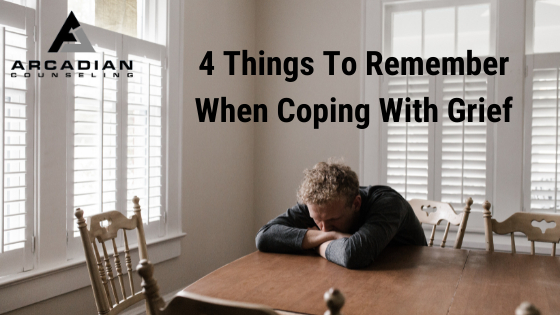“The reality is that you will grieve forever. You will not ‘get over’ the loss of a loved one; you will learn to live with it. You will heal and you will rebuild yourself around the loss you have suffered. You will be whole again but you will never be the same. Nor should you be the same nor would you want to.”
~ Elisabeth Kubler-Ross
Coping with grief after the death of a loved one is one of the hardest things we can go through in life. What can make coping with grief even more challenging is the feeling that we’re somehow doing it wrong – or all alone.
Grieving is a unique experience and there is truly no “right“ way to do it. Author Anne Morrow Lindbergh put it best when she said, “Grief can’t be shared. Everyone carries it alone. His own burden in his own way.“
While there is no one right way to grieve the loss of a loved one, there are some things that can help.
4 Things to remember when coping with grief
1. You will survive the loss

When coping with grief, just because it feels like your world will never be the same, doesn’t mean it won’t.
The pain of losing a loved one can be so intense that we may feel like it may cause our own death. But it’s important to remember that emotions, no matter how big, cannot harm you. However, what you do with those emotions, can be harmful.
In fact, not feeling emotions and avoiding them will often make the situation, and sometimes our health, much worse. Avoiding the pain of loss only slows the grieving process and we just end up taking our pain with us into the future.
You’ve probably hear the phrase, “Time heals all wounds.” Well, this is mostly a myth. Mostly, because it isn’t the time, it’s what you do with the time that creates the healing.
2. Understand the ebb & flow of grief
Grieving is a process with no stillness. There is always movement; an ebb and flow to your grief and pain. After a few weeks, you may have a day when you feel like you can finally catch your breath; where you notice how beautiful it is outside, and when your partner or kids are able to make you laugh. And then the very next day, you feel the darkness slide back in.
So goes the process of coping with grief.
This is natural. It’s important to remember to pay attention to these rhythms of grief. The more you become aware of the ebb and flow of your journey, the more you will begin to believe that soon there will be more good days than bad.
3. Practice self-care

Take care of yourself just like you would take care of a small child.
It’s important during this time that you take care of yourself just like you’d care for someone you loved. Be your own best friend. Be your own mother or father and take care of yourself like you would a small child.
Make sure to get enough rest and eat well, even if eating seems like the last thing you might want to do. Keeping up your strength is important.
Get fresh air and move your body. This can help alleviate the stress and tension. Above all, be kind to yourself mentally and emotionally. Don’t beat yourself up for crying in the bathroom on your lunch break. You would never do that to a child would you? Just allow yourself feel your feelings when they come and try to experience them with an attitude of openness and curiosity.
4. Get support
Don’t be afraid to reach out and ask for help and support. Don’t make the mistake of thinking that people that need help are weak. It’s the strong ones who have the courage to reach out and ask for help.
If you need someone to watch your kids so you can go for a while, ask. If your spouse was always the one to handle the repairs around the house, ask someone else to come over and take care of things.
Coping with grief is a uniquely personal experience. Everyone does it differently. The only wrong way is to try to ignore your feels and stay in a constant mode of distraction. All you’re doing is kicking the can down the road to deal with later.
James Killian, LPC is the Principal Therapist & Owner of Arcadian Counseling in New Haven, CT where they specialize in helping over-thinkers, high achievers, and perfectionists reduce stress, increase fulfillment and enhance performance so they can move From Surviving To Thriving.



